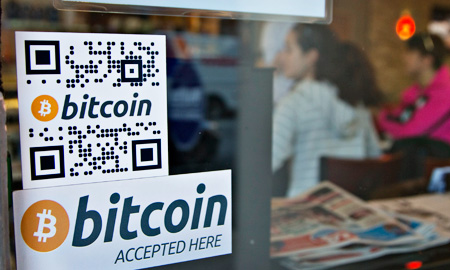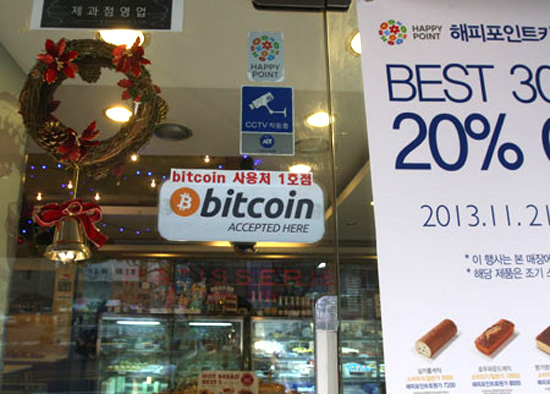- California Assembly OKs highest minimum wage in nation
- S. Korea unveils first graphic cigarette warnings
- US joins with South Korea, Japan in bid to deter North Korea
- LPGA golfer Chun In-gee finally back in action
- S. Korea won’t be top seed in final World Cup qualification round
- US men’s soccer misses 2nd straight Olympics
- US back on track in qualifying with 4-0 win over Guatemala
- High-intensity workout injuries spawn cottage industry
- CDC expands range of Zika mosquitoes into parts of Northeast
- Who knew? ‘The Walking Dead’ is helping families connect
Long road ahead for Bitcoin
Crash of world’s largest Bitcoin exchange leaves experts in doubt
By Kim Bo-eun
The recent crash of MtGox, once the world’s largest Bitcoin exchange based in Japan, is raising red flags about the prospects of the virtual currency and payment system.
MtGox opened in 2010 as one of the first Bitcoin exchanges and had played a central role in exchanges that occurred globally. However, following a halt in withdrawal services due to technical failures, the value of the Bitcoin plunged on the MtGox exchange. MtGox CEO Mark Karpeles resigned from the board of the Bitcoin Foundation, and shortly after, the exchange shut down its operations and filed for bankruptcy.
The ill fate of MtGox has prompted speculations of the downfall of the Bitcoin. While some say the technical failure and the resulting loss of trust in the currency has clouded its prospects, others say these are simply part of a new system’s initial ups and downs. But there is no doubt that even if the Bitcoin has a future, it faces a long, winding road ahead.
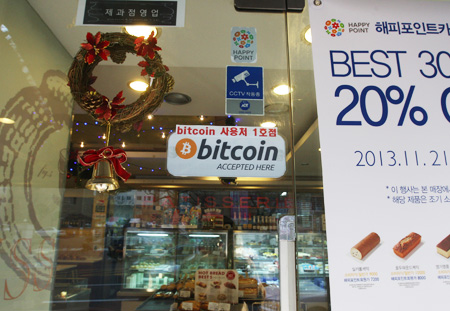
A bakery shop in Incheon became the first offline store in Korea to accept Bitcoin payments last November. Shops accepting Bitcoins have grown to 10 over the past few months, but expanded use of the virtual currency remains uncertain. (Yonhap)
MtGox and Bitcoin
Last November, MtGox recorded an all-time high value for a single coin at $1,242. In contrast, it traded the Bitcoin at only around $100 a few days before it crashed. This is about a fifth of the current average dollar trading price of the Bitcoin.
“MtGox was the largest Bitcoin trading exchange in the world. The fact that such an exchange market suffered technical faults and stopped operating implies that it has become difficult to trust and trade the Bitcoin as an asset,” Park Jong-hyun, a professor at Gyeongnam National University of Science and Technology, told The Korea Times’ Business Focus.
“Interest in the Bitcoin will not wane all of a sudden, but it is unlikely that the price will rebound to $1,000.”
Meanwhile, Korbit, the Bitcoin exchange in Korea, said the collapse of MtGox does not signal the decline of the Bitcoin.
“MtGox crashed because it was using a faulty system. Other exchange markets around the world are doing fine. This is not a problem with Bitcoin itself,” Korbit Director Kim Jin-hwa told Business Focus.
Kim said the status and role of MtGox had steadily declined since the third quarter of last year. Up until mid-2013, the exchange market had taken up 60 percent of the exchanges that occurred, but the size of the transactions had been rapidly shrinking. Apart from the technical problems the exchange experienced, Bitcoin prices had traded at significantly higher dollar prices on MtGox.
“You can see this as a natural response of the Bitcoin market — leveling down the prices and removing elements posing threat.”
While he conceded that the MtGox incident would inevitably leave a mark on the Bitcoin market, it would not shake the fundamentals of Bitcoin itself. In fact, while the average price of the Bitcoin continued to fall since MtGox stopped withdrawals, it started rising Tuesday, and since has hovered around $560.
“Bitcoin is still in its initial stages, so something like this was bound to happen. However, this will not be a major obstacle — you need to take a long-term view. It will not affect the expansion of Bitcoin as a payment system.”
Kim said Bitcoin has positive prospects here. Currently, about 300 million to 500 million Korean won is exchanged into Bitcoins daily. Since a bakery store in Incheon started accepting Bitcoins as a currency in November last year, the number of stores has grown to 10 in the past few months.
Bitcoins’ role as a currency
Bitcoins assume two distinct roles. They play the role of a currency that enables transactions and payments and the role of an asset that can be bought and sold like stocks to make profit.
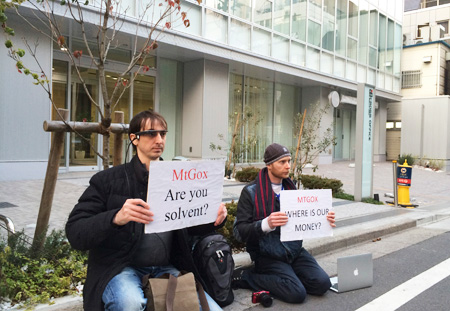
Bitcoin traders protest in front of a building housing MtGox, once the world’s largest online Bitcoin exchange in Tokyo, Tuesday. The exchange shut down operations and filed for bankruptcy after encountering theft of some hundreds of millions of dollars that resulted from technical failures. MtGox’s collapse has dealt a blow to the Bitcoin market, raising questions about the credibility of the unregulated currency. (AP-Yonhap)
They initially garnered attention as a potential currency because they made direct monetary transactions between individuals possible without mediators such as banks or credit card companies, thereby eliminating commission fees.
But Bitcoins started making headlines as their value skyrocketed toward the end of last year. More people started flocking to exchange markets where they could purchase Bitcoins like stocks, based on expectations that they could make big profits once Bitcoins take off as a major currency, making Bitcoin prices spike up to around $1,200.
But Park said Bitcoins needs to play a greater role as a payment method, as opposed to a speculation object as an asset.
“As long as Bitcoins remain an object of speculation, the public will remain wary of them. The success of Bitcoins as an asset obstructs their success as a currency,” Park said.
Kim at Korbit also said attention should and will increasingly be directed to the use of Bitcoins as a payment system.
“Last year was when Bitcoins caused a sensation, and a lot of speculation took place. This year is when Bitcoins will spread as a technology, a method of payment,” he said.
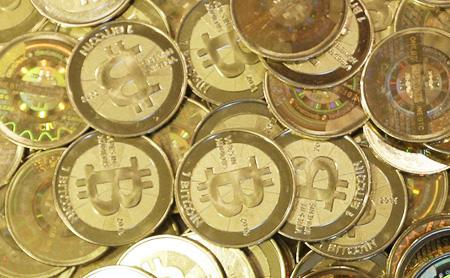
Bitcoin is a digital currency and payment system that enables direct transfers between individuals without a central authority or middlemen.
(AP-Yonhap)
Need for regulation
Several foreign media reported that security loopholes at MtGox resulted in a theft of some 744,000 bitcoins, amounting to around $350 million.
Earlier this month, the anonymous online marketplace Silk Road 2, which accepted Bitcoins in exchange for drugs and other illegal items, said it was hacked, losing some $2.7 million worth of Bitcoins.
Aside from security issues, the anonymous nature of Bitcoin transactions has also raised concerns about drug transactions, money laundering and other illegal activities. This has pointed to the need for regulation by state authorities.
While the Bitcoin gained popularity as a laissez-faire currency, experts point out that there needs to be some form of state regulation as well as global cooperation and control to enable it to function as a stable currency.
“One of the major problems with the Bitcoin is that it isn’t widely trusted. Trust in a currency is earned when the state approves of it. If, for example, governments accepted taxes in Bitcoins, the status of the Bitcoin as a currency would rise significantly,” Park said.
However, others say regulation goes against what makes the Bitcoin an attractive form of currency that’s free from central bank and government influence.
“Because virtual currencies such as the Bitcoin do not have intrinsic value, like promissory notes, they can instantly become nothing more than a piece of paper. However, while regulation of exchange markets could raise trust levels by preventing this sort of thing from happening, regulation defeats the purpose of the Bitcoin, which is being free from control, so it won’t work as a solution,” Kang Hyun-gu, an economist at Hyundai Securities, told Business Focus.
In the meantime, it doesn’t look like regulation will be imposed on Bitcoins anytime soon. The Bank of Korea (BOK) has remained skeptical about Bitcoins. Last December, BOK governor Kim Choong-soo said it is unlikely that they would become a widespread currency, stating security vulnerability and price volatility as some of the major underlying factors.
Kim Kun-woo, a researcher at the LG Economic Research Institute, said wider use of the currency depends on financial regulators’ response.
“The circulation of the Bitcoin as a private currency or legal tender depends on the response from regulators, but the stance of financial regulators in Korea is that they will wait and see until the Bitcoin ecosystem grows to a certain level.” Park agreed that it would take some time before the Bitcoin will become widely accepted. “As of now, with little analysis of the Bitcoin’s stability or its impact on the economy, the government is not likely to grant the Bitcoin an official status.”








